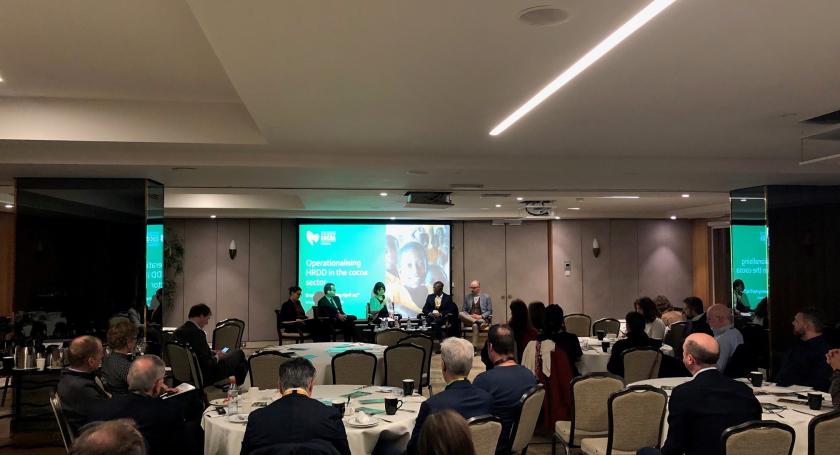On April 24, ICI organised a breakfast meeting on “Operationalising HRDD in the cocoa sector”, in the margins of the World Cocoa Conference in Brussels, with experts from the private sector, CSOs and the European Commission. It explored how new EU legislation, and especially the upcoming Corporate Sustainability Due Diligence Directive (CS3D) can be implemented in practice. In that context, the panel discussed what good human rights due diligence looks like in the cocoa sector, and how the cocoa-consuming countries such as those in the EU can support actors and producing countries to implement necessary processes and measures.
One of the key questions highlighted in the discussion was the need for coherence between the various legislative instruments currently under development at the European level, especially the CS3D and the Forced Labour Regulation (both approved by the European Parliament the week of the meeting), and the already approved European Deforestation Regulation and the Corporate Sustainability Reporting Directive. Speakers on the panel highlighted the need for a common understanding of due diligence that cuts across the different pieces of regulation.
The need for legal certainty on what constitutes good human rights due diligence was also discussed, with Antonie Fountain from the VOICE Network underlining that while such a desire was understandable, the principle of ongoing, risk-based human rights due diligence cannot be reduced to a tick box, compliance approach. “You have to show you are doing your best to solve the problem, there is not going to be legal clarity due to the nature of due diligence,” he said.
He also underlined the importance of transparency, explaining that “the CS3D requires companies to publicly acknowledge the size of their problem, and publicly communicate the impacts of efforts to tackle it”. However, he was keen to clarify that the legislation does not expect companies to not have any problems or to have already solved them, but rather it required companies to be taking steps to tackle them.He noted an increasing reluctance from companies to report on the issues as well as the findings and outcomes of efforts to prevent and address child labour, but urged the industry towards full transparency, highlighting that there is also a role for civil society organisations to support (rather than criticise) efforts of transparency.
Linked to the discussion around transparency and reporting, many speakers highlighted the need for clear definitions both on what constitutes child labour and forced child labour, and on how to report the impacts of systems put in place to tackle child labour and forced labour. As an example, speakers highlighted that while many companies today have Child Labour Monitoring and Remediation Systems (CLMRS) in place, there is significant heterogeneity in their application and effectiveness. Alignment around quality and harmonisation between systems will be important, to reach impact at scale.
Another key topic discussed was the role of national traceability systems. Sylvestre Séka Séka, representing the Côte d’Ivoire’s Conseil Café-Cacao (CCC), highlighted that Côte d’Ivoire has already invested significantly in a census of cocoa producers, and the development of a national traceability system, which will ultimately incorporate data both around child labour and deforestation. Although the implementation of national traceability systems represents a significant cost to producing countries, the CCC expects these costs to be ultimately covered by increased prices of cocoa and chocolate products, Séka Séka explained.
Other speakers highlighted the importance of linking between the different national systems on traceability and child labour monitoring, and those being implemented by the private sector. “Links are being made between data collected by the private sector and the SOSTECI system [Côte d’Ivoire’s child labour monitoring system], which should help us be more efficient and cover parts of the country that aren’t yet being covered,” underlined Isabelle Adam from Touton.
The role of the EU in supporting the various actors and especially producing countries to have the right systems and services in place to better protect human rights, but also to develop both the national child labour monitoring systems and the national traceability systems, was also highlighted, with Régis Méritan from the European Commission noting the importance of investment through bilateral agreements, which could be framed within Sustainable Investment Facilitation Agreements (SIFAs). First tested with Angola, the European Commission is intending to extend this new instrument to the two West African cocoa-producing countries.

